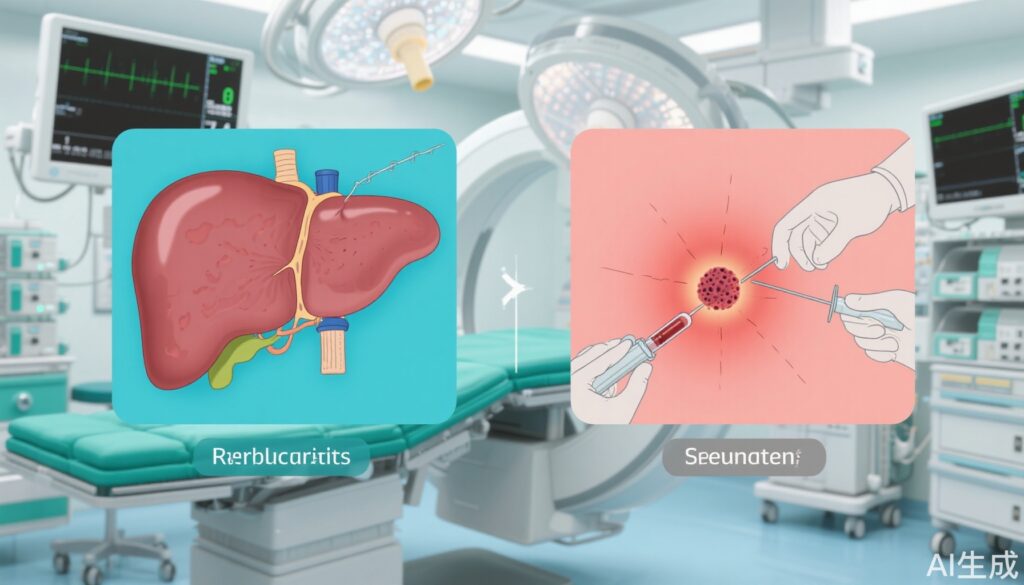Highlights
- The SURF-RCT is the largest randomized controlled trial directly comparing surgery versus radiofrequency ablation (RFA) for small hepatocellular carcinoma (HCC).
- No significant difference was seen in 5-year overall survival or recurrence-free survival between surgery and RFA.
- Serious adverse events were more common with surgery, but both treatments were overall safe and effective.
- The findings support RFA as a minimally invasive, first-line alternative to surgery for patients with small HCC.
Study Background and Disease Burden
Hepatocellular carcinoma (HCC) is the most common primary liver malignancy and a leading cause of cancer-related mortality worldwide. Early-stage HCC, typically defined as tumors ≤3 cm and up to three nodules, offers the opportunity for curative intervention. Surgical resection and percutaneous ablation, especially radiofrequency ablation (RFA), are the primary curative modalities. However, the optimal first-line treatment—particularly for small, solitary tumors—remains controversial. Surgery is traditionally viewed as the gold standard, but RFA offers the advantages of being less invasive and better tolerated, especially among patients with compromised liver function. Previous studies have been limited by retrospective design, selection bias, or insufficient sample size, underscoring the need for robust evidence.
Study Design
The SURF-RCT (Surgery versus Radiofrequency ablation For small hepatocellular carcinoma – Randomized Controlled Trial) was conducted across 49 Japanese institutions between 2009 and 2015. Eligibility criteria included adults with HCC characterized by a maximum diameter ≤3 cm and ≤3 HCC nodules, without major vascular invasion or extrahepatic spread. Patients were randomized to surgery or RFA, with co-primary endpoints of overall survival (OS) and recurrence-free survival (RFS).
Simultaneously, patients eligible for the main trial but declining randomization were enrolled in a nonrandomized prospective observational cohort (SURF-Cohort) and allocated to surgery or RFA based on patient and physician preference. This design allows assessment of efficacy in both randomized and real-world clinical contexts.
Key Findings
SURF-RCT Results
A total of 302 patients were randomized (surgery n = 150, RFA n = 152). The baseline population was well balanced; 90% had solitary HCC and about 65% had tumors ≤2 cm. The median follow-up was not specified, but 5-year outcomes were reported.
– 5-year overall survival (OS):
– Surgery: 74.6%
– RFA: 70.4%
– Hazard Ratio (HR): 0.96 (adjusted P = .84)
– 5-year recurrence-free survival (RFS):
– Surgery: 42.9%
– RFA: 42.7%
– HR: 0.90 (adjusted P = .84)
No statistically significant difference was observed in OS or RFS between the two arms.
– Serious adverse events occurred in 3.3% of surgical patients, compared to none in the RFA group.
Upon recurrence, the majority of patients in both groups received RFA as the secondary intervention, and a minority underwent repeat resection.
SURF-Cohort Results
Among 753 patients (surgery n = 382; RFA n = 371) in the nonrandomized cohort, baseline characteristics were more heterogeneous compared to the RCT. After inverse probability of treatment weighting (IPTW) to adjust for confounders, no significant difference in OS (P = .77) or RFS (P = .08) was detected between groups.
Safety and Recurrence Patterns
Surgery, while effective, carried a higher risk of serious complications, though overall rates remained low. RFA was associated with fewer complications, reinforcing its safety profile. In both groups, most recurrences were managed with further RFA.
Comparative Table: Main Results from SURF-RCT
| Outcome | Surgery | RFA | Hazard Ratio | P Value |
|---|---|---|---|---|
| 5-year OS | 74.6% | 70.4% | 0.96 | 0.84 |
| 5-year RFS | 42.9% | 42.7% | 0.90 | 0.84 |
| Serious AEs | 3.3% | 0% | — | — |
Expert Commentary
The SURF-RCT and SURF-Cohort trials provide definitive, high-quality evidence for the management of small HCC. The rigorous design, large sample size, and real-world cohort enhance the generalizability of the findings. These data align with recent guideline trends, such as the American Association for the Study of Liver Diseases (AASLD), which increasingly support ablation as an alternative to surgical resection for early-stage tumors, especially when surgery poses elevated risk or is not feasible.
However, several nuances merit consideration:
– The majority of patients had solitary, small (<2 cm) tumors; the findings may not fully extrapolate to larger or multifocal disease.
– Long-term liver function preservation, patient comorbidities, and resource availability should guide individualized treatment decisions.
– The higher rate of serious adverse events with surgery highlights the value of minimally invasive approaches in suitable candidates.
Further studies could elucidate outcomes in subpopulations (e.g., those with marginal liver function or tumors adjacent to major vessels) and explore the role of emerging ablation technologies.
Conclusion
The SURF-RCT and SURF-Cohort trials conclusively demonstrate that surgery and RFA yield comparable long-term survival and recurrence rates for small HCC (≤3 cm, ≤3 nodules) in a largely solitary tumor population. Given the lower risk of serious complications and minimally invasive nature, RFA should be regarded as a valid first-line option alongside surgery. Personalized treatment planning, considering patient preference, comorbidities, and institutional expertise, remains paramount.
References
Kawaguchi Y, Hasegawa K, Kashiwabara K, Okamura Y, Kurosaki M, Kudo M, Shimada M, Yamanaka N, Inomata M, Yamashita T, Tateishi R, Shiina S, Fujishiro M, Matsuyama Y, Omata M, Kokudo N. Surgery Versus Ablation for Hepatocellular Carcinoma: A Randomized Controlled Trial (SURF-RCT Trial) and a Nonrandomized Prospective Observational Trial (SURF-Cohort Trial). J Clin Oncol. 2025 Aug 10;43(23):2628-2638. doi: 10.1200/JCO-24-02030. PMID: 40554738.
American Association for the Study of Liver Diseases (AASLD) Practice Guidance: Management of Hepatocellular Carcinoma. Hepatology. 2023;78(1):1-32.



